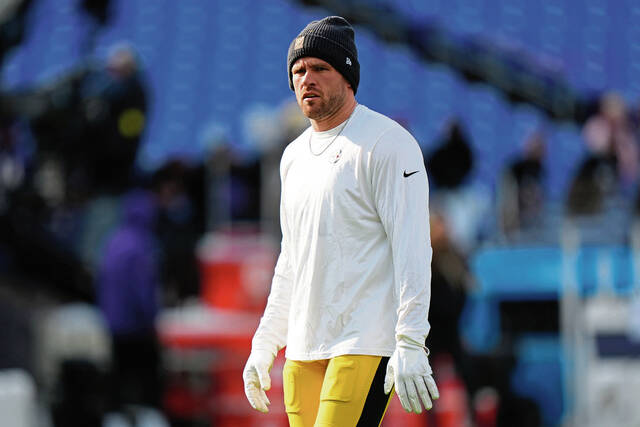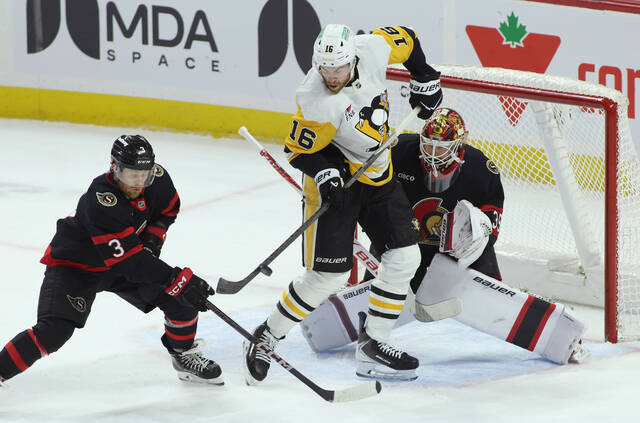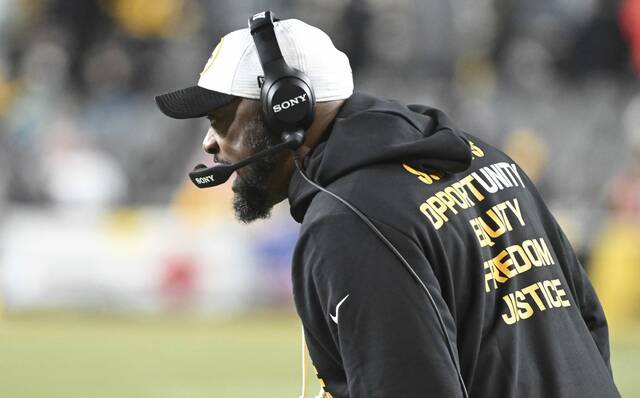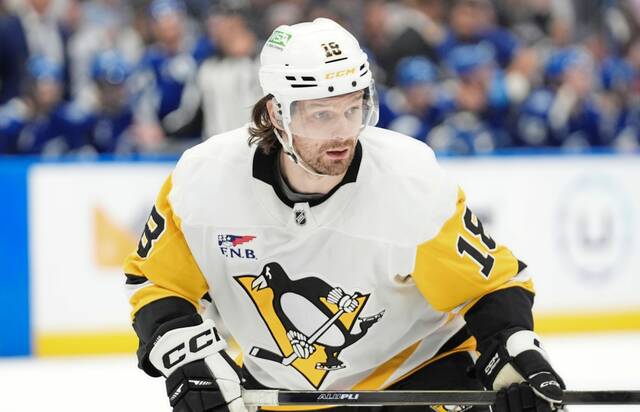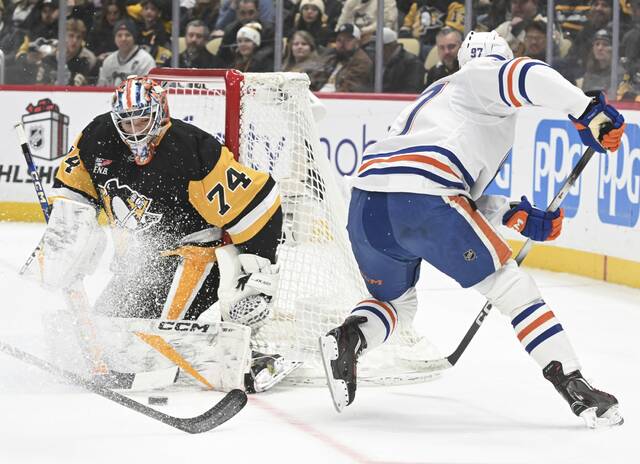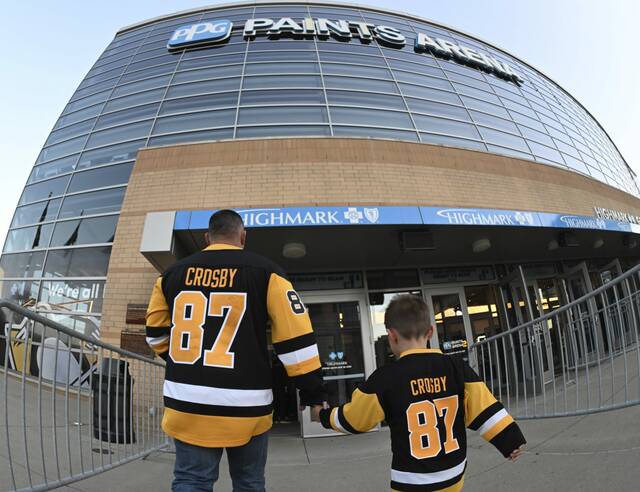When former Pittsburgh Penguin Grant Jennings talks, his voice sounds like hockey.
It’s a Western Canadian accent with a tough, low grumble to it. There’s a spirited gravel that sounds like it comes along with 14 professional years — and nearly 1,500 penalty minutes — at all levels of the sport.
When Jennings discusses hockey, he sounds like Quint in “Jaws” talking about sharks.
Especially when you ask him about the 1993 playoffs.
“Dave Volek,” Jennings’ throat rattles at the mention. “His name is scratched in my skull.”
Thirty years ago, New York Islanders winger David Volek scored in overtime of Game 7 to eliminate the Penguins from the 1993 Patrick Division Final. Every fan at the Civic Arena instantly knew they had just witnessed one of the most soul-crushing losses in Pittsburgh sports history.
In advance of Sunday’s 30th anniversary of that Game 7, I spoke with former Penguins and Islanders who participated in it. Very few of them had trouble vividly remembering the game.
Or the final goal.
“I think about it,” said Penguins backup goalie Ken Wregget three decades later. “I can close my eyes, and I can see it like a projector on the back of my eyelids.”
‘We had everything we needed’
On the heels of Stanley Cup titles in 1991 and 1992, the ‘92-93 Penguins racked up 119 points and went 17-0-1 down the stretch of the regular season. Despite being sidelined with treatments for Hodgkin’s lymphoma, captain Mario Lemieux posted an ungodly 160 points in just 60 games. He was one of four Penguins with at least 100 points and one of five with at least 30 goals.
To outside observers, the playoffs appeared to be a formality en route to a coronation for the ‘90s Penguins. They were about to elevate to elite franchise status with a three-peat. The previously forlorn organization was about to jump into hockey’s historic stratosphere with the likes of those ‘80s Islanders and the Montreal Canadiens of the ‘60s and ‘70s.
Related:
• 30 years after on-ice collision, former Penguin Kevin Stevens relives that moment and his long comeback
• U mad, bro?: Pirates fans already turn sour from May slump; Penguins fans grumble about missing playoffs
• Mark Madden: With Penguins committed to winning now, they should trade No. 14 pick
As 1993 rolled along, those first two Cup seasons now were feeling like just an appetizer for the feast that was to come in that spring.
“That was our best team,” general manager Craig Patrick said. “We had depth on defense. We had good goaltending. We had everything we needed. We had it right here.”
After dusting the New Jersey Devils in five games to start the postseason, the Islanders — who tied New Jersey with a modest 87 points for third place in the Patrick Division — were positioned by fans and media to be nothing more than the next victim. Especially because they were set to open the series without top scorer Pierre Turgeon. He had been injured at the end of their series-clinching Game 6 win over the Washington Capitals, courtesy of a cheap shot from Dale Hunter.
But within the Penguins dressing room, there was a different tone.
“Throughout the season, we always had problems with the Islanders,” Hall of Famer Joe Mullen recalled. “They were kind of built because of us: big, strong, fast. I think we knew we were going to have our hands full.”
The Islanders and Penguins played seven times during the regular season. New York won three of those games. Coach Al Arbour’s team was the only club to beat Pittsburgh three times that season. The combined score of those games was Penguins 26, Islanders 21.
“We didn’t take them lightly at all. We knew what they brought to the table each time. We knew it was going to be a grind,” defenseman Peter Taglianetti insisted.
The way former Penguins winger Kevin Stevens tells it, if any overconfidence existed, it might have been looming if the Penguins advanced.
“If we could’ve gotten through the Islanders, L.A. (in the Stanley Cup Final) and Montreal (in the Wales Conference Final), we could’ve beaten those teams skating backward. I think our team was that good,” Stevens insisted.
So even after 30 years of self-evaluation, no one on the team could go back in time and find disrespect toward the opponent. But defenseman Larry Murphy suggested that a different type of intangible might have been percolating within the team.
“I thought the worst thing that happened to our team was that winning streak at the end of the season because no matter how we played, we were winning. And I think maybe some bad habits crept into our game,” Murphy said. “When you win like that, everything slides. The attention to detail suffers. … That sense of urgency is not there, and I think that factored into what eventually happened to us.”
And the Islanders proved to be the perfect kind of team to exploit those bad habits.
‘We had no strategy because we had no chance’
Especially without Turgeon and his 132 points, the Islanders knew the odds were against them.
“We had no strategy because we had no chance,” Islanders defenseman (and future Penguin) Darius Kasparaitis said. “My friends were making bets with me. If we won just one game, I’d get free dinners from all of them.”
Yet the Isles showed right away that they were going to be a problem in the best-of-seven series.
“Losing Turgeon was definitely a rallying cry for them,” Murphy said. “They were definitely the underdog, and they rallied around that.”
The Islanders won Game 1 in Pittsburgh 3-2 thanks, in part, to two shorthanded goals from Ray Ferraro and Benoit Hogue — two of the many Islanders who stepped up in Turgeon’s absence. Ferraro and Derek King led the team with eight points apiece in the series. Steve Thomas had three goals, and Hogue added two and had five assists.
Islanders goalie Glenn Healy stopped 28 of 30 shots in the first contest.
“He played well,” Jennings said. “He was part of that defensive scheme. Killing the play whenever he could. Freeze the puck, jump on the puck because we could generate offense from everywhere. Just kill every opportunity.”
Pens goalie Tom Barrasso outdueled Healy the next two games, though, posting 3-0 and 3-1 wins, before the Islanders evened the series at two apiece by way of a 6-5 win on Long Island in Game 4.
Even though the Penguins bounced back at the Civic Arena in Game 5 with a 6-3 victory, a trend was developing. The Islanders were agitating the Penguins to the point of exasperation. Players such as Rich Pilon and Kasparaitis were frustrating Lemieux, Jaromir Jagr and the other Penguins stars.
“Kasparaitis drove Mario (expletive) crazy,” Stevens said.
That especially bubbled up in Game 6 back in New York when the two had an extended altercation in the second period.
But it was Ron Francis who ended up with a five-minute high-sticking penalty and a game misconduct. The Islanders scored twice on the power play during that period, eventually winning 7-5.
Through six games, the Pens rolled up 101 penalty minutes and had allowed nine special teams goals (five on the power play, four shorthanded). Kasparaitis didn’t have a goal in the series, but his fingerprints were all over it. He posted four assists, and his knack for harassing the opposition into committing penalties was a major storyline. But the Penguins didn’t retaliate, at least not to the degree that Kasparaitis ever felt the need to stop.
“We all could see it,” Jennings said. “Without coming out and telling somebody, ‘Hey, you got to do something with this guy,’ I mean, it was pretty obvious. You knew what had to be done, but no one ever did it. … It’s still something I think about it. What should have been done about Kasper? Because whatever it was, it wasn’t that.”
Until he eventually got traded to the Penguins, Kasparaitis became a pariah in Pittsburgh. And he loved it.
“I didn’t really have an assignment to drive Mario crazy. … I didn’t really care about any star players, any big-time names. So I just played my style of game, and then, lucky me, it ended up being against Mario and Jagr. A couple of good hits, the energy of Nassau Coliseum, I just needed to do more and more,” Kasparaitis recalled.
That lasted for four years before the trade.
“People had signs in the stadium, ‘You are a rat’ and all these things. There was this girl — she was so annoying, she always sat next to the bench — she would squeak all the time during the games,” Kasparaitis said.
But it never stopped “Kasper” from constantly needling the Penguins — all the way to a decisive Game 7 back in Pittsburgh.
‘I fully expected we were going to win’
The seventh game, on May 14, 1993, had bad vibes from the start. Turgeon returned to the ice. While providing an emotional pop, Turgeon was so limited physically that Healy described him as being essentially “an ornament on the tree.”
Penguins broadcaster Paul Steigerwald tells the story of how he caught a glimpse of Lemieux getting training attention before the game for his notoriously balky back.
“You could tell he was hurting,” Steigerwald said.
Lemieux also rang a post early in the game on a breakaway. Then there was the horrific injury suffered by Stevens when he collided with Pilon early in the first period. Stevens was knocked unconscious in mid-air. He fell face-first onto the ice.
“When I hit him, I hit his shield. And it got my temple and knocked me out cold,” Stevens said.
Stevens’ face needed hours of surgery the next day and multiple metal plates during reconstruction. He had to leave the ice on a stretcher. Both Jennings and Murphy spoke about how the team was shaken by witnessing the injury, and Mullen pointed to how much Stevens’ absence scrambled the Penguins from a tactical standpoint.
“Big time,” Mullen said. “We had so many different line combinations. But we were a veteran team. We all played with each other at one time or another. So I don’t think we can use that as an excuse.”
The Islanders took a 3-1 lead late into the third as Healy sparkled in net en route to 42 saves. But Francis scored off a Murphy pass at 16 minutes, 13 seconds of the third to pull within one. Then Rick Tocchet forced overtime with a minute remaining on a deflected puck that had been redirected by Francis off a shot by Murphy.
The roof nearly blew off the Civic Arena, and during the intermission before overtime, it felt like the Islanders had taken their best shot. Now it was just a matter of time before the mighty Pens put them away.
“I fully expected we were going to win,” Patrick said when thinking back to the start of overtime.
‘What do you think of David (expletive) Volek now?’
David Volek, a toolsy Czech-born forward, played in only 56 games during 1992-93. That was 18 fewer than the previous season. He was a frequent scratch. He didn’t play at all in the Washington series or in the first two games of the Penguins series. He played the next four but was scoreless.
Skilled but inconsistent, he often found himself in the doghouse of the coaching staff and in a contract dispute with the front office. Trade speculation was frequent.
But Arbour gave him a jersey again in Game 7 despite being held without a point in the series. Volek scored New York’s second goal of the game to break a 1-1 tie.
Then, in overtime, Penguins defenseman Ulf Samuelsson pinched down the left wall and tried to make a pass in the offensive zone. It became a turnover, and the Islanders raced the other way in transition. Kjell Samuelsson and Marty Straka tried to get back in time to bust up the play. A two-on-one with Ferraro and Volek developed. Ferraro made a perfect pass to Volek. Barrasso came out to challenge the shot.
But Volek beat him at the 5:16 mark with perhaps the most infamous goal-against in Penguins history, ending the franchise’s three-peat quest.
“Nine out of 10 times — 10 out of 10 times — Tommy stops that puck,” Taglianetti said.
Maybe this was the 11th time, then.
Barrasso has taken 30 years of grief in Pittsburgh for allowing that goal. Through the Italian team (Asiago) Barrasso now coaches, an interview request for him was denied. But Wregget stuck up for his goaltending partner, suggesting that because Barrasso came out to challenge and cut down the angle, the resulting goal looked worse than it really was.
“You think that could have been blocked or saved or something, but all the right things lined up for (New York) at that point,” Wregget said. “It’s just a good transition on their part. They came back odd-man, and the puck was shot out a bit. That’s what makes it tough. It was a heck of a play.”
Anyone who was at the Civic Arena that night instantly talks about the immediate silence after Volek’s goal. In a matter of seconds, a place that had more than 17,000 screaming people in it suddenly became the quietest place in the world. Ferraro
“I’ll never forget the shocked looks on the Penguins’ faces, not the jubilation on ours,” Ferraro said.
After the game, Healy tells the story of an encounter between Arbour and some members of Islanders management who wanted to trade Volek.
“I can recall standing with Al by the team bus after we had won,” Healy said. “And (management) came over, and they were very excited that we beat the dynasty Pittsburgh Penguins. And Al looked over and said, ‘What do you think David (expletive) Volek now?’ ”
Funny. He seems to have the same middle name in Pittsburgh to this day.
’The most disappointing loss of my career’
Defenseman Lyle Odelein was a Penguin for one year in 2006. He was on the Canadiens in 1993. He once told Patrick that they were watching the Islanders beat the Penguins on television as a team during Game 7. The club knew they would play the winner of that series in the conference final.
“Lyle said, ‘That was the greatest moment in our lives when (Volek’s) puck went in the net. Because now we knew we had a chance to win the Stanley Cup,’” Patrick relayed.
They did. In five games over the Kings, after beating the Islanders in five as well. Without having to play the Penguins at all.
Murphy played for more than two decades in the NHL, won four Stanley Cups (two in Pittsburgh) and was inducted into the Hall of Fame in 2004. Yet he still finds it difficult to talk about May 14, 1993.
“For me, that was the most disappointing loss of my career,” Murphy said. “I played 21 years, and that, by far, was the biggest disappointment.”
Every North American sports market has painful defeats such as that one in its archives. Just six months earlier, Pittsburgh had endured the infamous “When Sid Slid” game to end the 1992 Pirates season in the National League Championship Series. Boston had Bucky Dent and Bill Buckner. Buffalo had “wide right” in Super Bowl XXV.
But in each of those examples, the team in question hadn’t won a championship in decades, if at all. In each case, the drought extended decades longer, and in the case of the Bills and Pirates, it continues to this day.
For the ’93 Penguins, though, that wasn’t the case. They were coming off two straight Stanley Cups and were looking to be the first team since the 1980-83 Islanders to win three in a row. As good as the ’91 and ’92 teams were, the ’93 team appeared to be even better.
The Pirates’ loss had a haunting pall of an era ending. This Penguins’ defeat created an acrid taste of destiny unfulfilled and missing out on immortality. Very different circumstances. Very similar pain.
“David Volek,” sighs Taglianetti. “I’ll never forget that (expletive) name.”
No one in Pittsburgh ever will.
Podcast: Islanders goalie Glenn Healy relives the 1993 playoff upset of the Penguins




